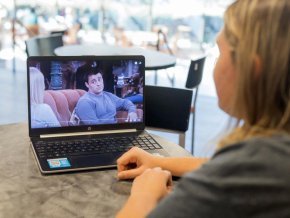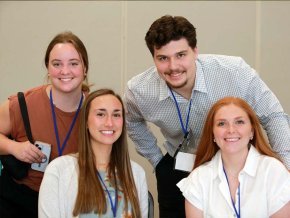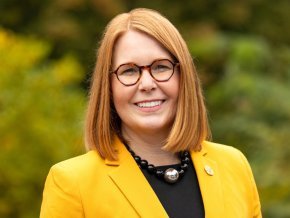
A new take on familiar entertainment

Over the past 10 years, colleges and universities have brought courses focused on pop culture into the mainstream of academics. In classrooms around the country, today’s students are analyzing “Game of Thrones,” the Marvel Cinematic Universe, Beyonce’s music and more. At Lenoir-Rhyne, they’re studying sitcoms and “Star Wars” in an empowering exchange of ideas.
“Popular culture is a great way to have the conversations that mean the most to people at a given time. Students are already invested in the material through their own experiences or the experiences of people they know,” shared Amy Sturgis, Ph.D., adjunct humanities professor. Her course “The Force of ‘Star Wars’: Examining the Epic” has been offered at LR since 2017.
Communications professor Bill Richter, Ph.D. takes his roster full of students through television shows we grew up with and those we are still watching in his “Sitcoms and Society” course.
“People don’t always realize that pop culture is important culture. I want to see my students think more critically about the things they take for granted,” shared Richter, who has been teaching the course since 2020.
The course will be with you
“The Force of ‘Star Wars’” takes an interdisciplinary approach to analyzing one of the most successful and influential epics of the modern era.
“From my research and writing projects about ‘Star Wars,’ I knew there were a lot of disciplinary approaches. One week we might be looking at how ‘Star Wars’ looks at historical patterns, democracies moving to a totalitarian regime,” Sturgis explained. “The next week we might be talking about free will versus destiny in philosophy. The next, technology shown in the films and in our world.”
One facet of the course is discussion and analysis of the common texts for the class — the trilogy films, offshoot films, TV series and readings that comprise the “Star Wars” universe. Because that universe can be approached from so many analytical angles, Sturgis bases the other facet of the course around an independent research project.
“The research part of the class is student-driven, so I’m learning along with them through their projects. They’re co-teachers in this class,” Sturgis shared.
Past projects in her course have looked at the film series through the lens of physical therapy, psychoanalysis, environmentalism, robotics and more.
“Science fiction is always doing two things. It’s reflecting on what is happening at the time it’s created — the values and conversations of the time — but it’s also pushing toward a vision of the future,” said Sturgis. “By its nature, science fiction wants to invite audiences to be part of making the world better.”
The full course of comedy
It may not seem obvious how a 30-minute weekly show about a family, a group of friends, or an office could have much in common with a series about aliens and galactic empires, but the driving purpose behind the opposing genres is surprisingly similar.
“The early sitcoms showed us the way that American society thought we were — a family with two kids, living in the suburbs, mom stayed at home — and that was sort of like the ideal. But later on, they came to be used not only to reflect what society was but to hold up the mirror and try to change society. You see that in the 70s with shows like ‘MASH’ and writers like Norman Lear,” explained Richter.
Although he maintains a few constants on the syllabus for context — works by Geoffrey Chaucer, William Shakespeare, Lucille Ball — a lot of Richter’s curriculum is adapted to fit each semester’s group of students.
“Everyone has seen ‘Friends’ and ‘The Office. ’ multiple times. I try to get a feel for what they like and what they’re interested in, then I try to bring out shows they might not know but are in the same vein,” he said.
Focusing on students and their connections to the material — one assignment asks students to imagine their own lives as a sitcom, another conducts research on the social and historical context surrounding a student-chosen series — gives them a window to look at themselves and the world around them through the lens of their favorite entertainment.
Richter revealed, “Out of all the times I’ve taught classes, this is the only class where I’ve had students actually come up and thank me for the homework.”

Lenoir-Rhyne University students showcased their academic excellence and research expertise at the 2025 North Carolina Academy of Science (NCAS) annual meeting in late March.
View More
Lenoir-Rhyne University has selected Summer McGee, Ph.D, as the institution’s 13th president. Her appointment was enthusiastically approved by the Lenoir-Rhyne Board of Trustees after a national search.
View More